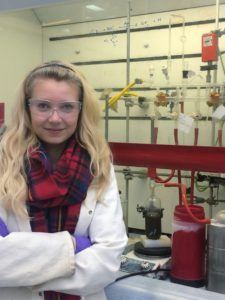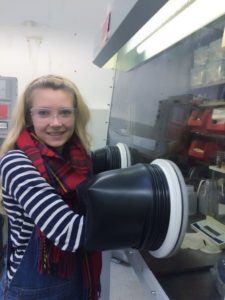Profile
Megan Seymour
Look out for the supermoon tonight!
-
About Me:
I live in Edinburgh with my 2 hamsters, Polly and Jason.
-
Read more
I live in Edinburgh with my 2 hamsters, Polly and Jason. I named them after my bosses, before I realised that they were both boys. Polly and Jason the humans find this a bit confusing.
I volunteer on a helpline for injured bats and am working my way around Europe taking part in half marathons. -
Read more
Nuclear power stations provide around 10 % of the world’s electricity, with uranium being the most common nuclear fuel. Before it can be used as fuel, uranium that is mined from the earth undergoes a process called enrichment. This process increases percentage of the more radioactive isotope uranium 235.
The enrichment process produces vast quantities of a less radioactive isotope, uranium 238, known as depleted uranium. This depleted uranium is stockpiled all over the world and would take billions of years to decay naturally.
A catalyst is a substance that can increase the rate of a chemical reaction. The catalyst itself remains unchanged at the end of the reaction so only very small amounts of catalysts are needed even when reactions are being done on very large scales. Catalysts decrease the amount of energy needed in almost all industrial chemical processes, for example in the production of fertilizers, the processing of petrol and oil, and in the production of medicines. Most catalysts are molecules containing rare and expensive metals such as platinum, palladium and rhodium. These metals are very expensive, and they are running out!
Modern methods allow scientists to work safely with uranium and uranium containing molecules, so the focus of my research is on trying to make useful catalysts out of depleted uranium, at the same time as discovering brand new ways in which uranium can react!
-
My Typical Day:
I spend most of my time doing reactions in the lab, but also spend time looking at my data in the ofice.
-
Read more
Most of the compounds that I make and work with are not stable in air. This means that if they are exposed to oxygen they decompose, sometimes by bursting into flames! Because of this my reactions have to be done in an atmosphere of nitrogen, so in a glove box (picture below) or on something called a Schlenk line. A Schlenk line is a system that allows you to suck all of the oxygen containing air out of reactions using a vacuum pump, and then pump in nitrogen in instead.
-
Education:
Gilmorton Primary School (1997-2004), Rugby High School (2004-2011), Durham University (2011-2015), Edinburgh University (2015-present).
-
Qualifications:
GCSEs, A Levels, BSc degree, Masters in Chemistry.
-
Work History:
Morrisons, Kilworth House Hotel, The Crown Inn.
-
Current Job:
PhD student in small molecule activation by Uranium.
-
My Interview
-
How would you describe yourself in 3 words?
Custard doughnut enthusiast.
Were you ever in trouble at school?
Yes, all the time!
Who is your favourite singer or band?
The Lumineers.
What's your favourite food?
Pesto
If you had 3 wishes for yourself what would they be? - be honest!
I want a pet donkey. I want to live in a giant treehouse. I want to travel the world.
Tell us a joke.
I couldn’t think of a joke, so I drew a unicorn. I knew my art GCSE would serve me well.
-


